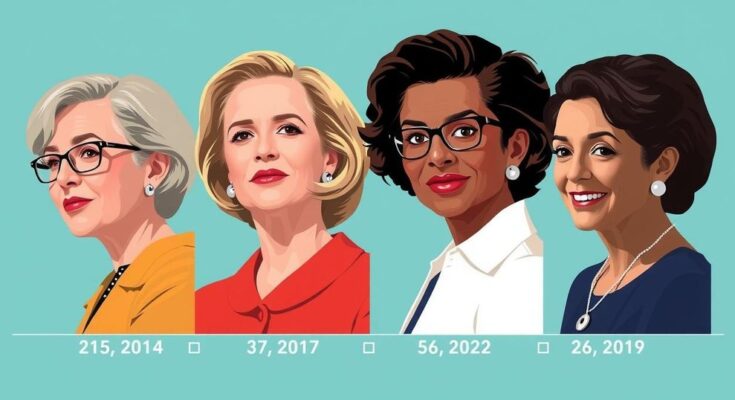The year 2024 marked the slowest growth in female political representation globally, with 27 parliaments electing fewer women and a negligible growth rate of 0.03%. Countries employing gender quotas showed more significant improvements compared to those without. Challenges such as financial barriers, societal expectations, and increased hostility toward female politicians impede progress, emphasizing the need for continued advocacy and structural changes to foster gender equality in political representation.
In 2024, which witnessed major elections affecting approximately half of the global population, the progress of women in political representation has come to a near standstill, marking the slowest growth in female representation in two decades. Reports indicate that 27 newly elected parliaments have recorded a decrease in the number of female members, with countries like the United States, Portugal, and India experiencing significant losses. Notably, for the first time, fewer women were elected to the European Parliament, highlighting a concerning trend.
The Inter-Parliamentary Union (IPU) analyzed data from 46 nations and found that almost two-thirds saw a decline in elected women. While notable gains were achieved in nations such as the United Kingdom, Mongolia, and the Dominican Republic, the overall positive impact was overshadowed by the losses elsewhere, resulting in an insignificant global increase of just 0.03% in female political representation. Mariana Duarte Mutzenberg, a gender statistics analyst at the IPU, labeled the progress as “too fragile.” Countries with gender quotas, such as Mongolia, demonstrated more substantial gains than those without.
Globally, women currently comprise 27% of parliamentary positions, with many countries still lagging behind in representation. Factors such as ambition gaps, financial limitations, and electoral systems significantly hamper female participation. For instance, women often face challenges in securing funding for campaigns and balancing societal expectations related to caregiving roles.
Furthermore, the design of electoral systems impacts female election rates, with proportional representation systems yielding higher female member percentages. It is crucial to note the rising climate of hostility toward women in politics, exacerbated by online threats and disinformation campaigns, particularly in places like Mexico where gender-based violence against women in public life is prevalent. This hostility can create barriers for aspiring female candidates and cultivate a culture of fear that deters young women from pursuing political careers.
The significance of equitable representation in parliaments cannot be overstated. Diverse legislative bodies are associated with enhanced economic decision-making and social outcomes. Studies indicate that inclusion of women in peace negotiations contributes to more effective and enduring agreements. Ultimately, as emphasized by Julie Ballington from UN Women, it is imperative to shift the narrative surrounding women’s political presence, recognizing it as a matter of men’s over-representation rather than women’s under-representation.
The issue of female political representation is central to discussions on gender equality and democratic governance. Despite previous advancements in the global representation of women, recent data indicates a troubling stagnation in growth. Various factors contribute to this trend, including electoral design, societal attitudes, and barriers to entry for women pursuing political roles. Understanding these dynamics is crucial to addressing and improving female representation in politics.
In conclusion, the year 2024 has revealed a troubling stagnation in women’s political representation worldwide, with various factors contributing to this decline. The findings underscore the need for persistent efforts to enhance female participation in governance and address systemic barriers. Ensuring equitable representation is not only a matter of fairness but also essential for fostering more inclusive and effective decision-making processes across the globe.
Original Source: www.bbc.com




